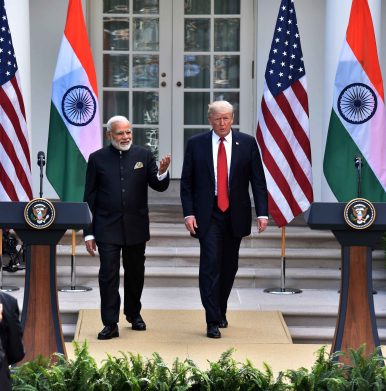By Ankit Panda
 U.S. President Donald J. Trump, Japanese Prime Minister Shinzo Abe, and Indian Prime Minister Narendra Modi will meet on the sidelines of the upcoming 2018 G20 leaders’ summit in Buenos Aires, Argentina, in what will be the first trilateral leaders’ meeting of the three countries.
U.S. President Donald J. Trump, Japanese Prime Minister Shinzo Abe, and Indian Prime Minister Narendra Modi will meet on the sidelines of the upcoming 2018 G20 leaders’ summit in Buenos Aires, Argentina, in what will be the first trilateral leaders’ meeting of the three countries.
In a briefing on Tuesday, U.S. National Security Adviser John Bolton noted that Trump would meet Abe for a bilateral summit and that meeting would transform at some point into a trilateral meeting” with the Indian prime minister.
Bolton addressed the topic in the context of a question he received at a White House briefing on whether Trump would meet bilaterally with Saudi Crown Prince Mohammed bin Salman. Bolton said that Trump wouldn’t meet the Saudi crown prince given his long list of sideline meeting in Buenos Aires, including the trilateral.
For New Delhi, Washington, and Tokyo, the upcoming trilateral meeting between the leaders’ will be an important first and serve as a symbolic moment to underline the three capitals’ common interests in a coherent Indo-Pacific strategic region.
Along with Australia, the three countries compose a quadrilateral group of like-minded democracies that have also increased their coordination after a November 2017 working-level meeting in Manila, on the sidelines of the Association of Southeast Asian Nations’ summits.
This so-called “quad” has met two additional times since, including this month in Singapore. The quadrilateral was originally constituted in 2007, during Abe’s first non-consecutive prime ministerial term, but was disbanded thereafter amid Chinese criticism.
Trilateral coordination between India, the United States, and Japan has grown in recent years, most notably with the 2015 trilateralization of the U.S. Navy-Indian Navy Malabar naval exercise to include Japan’s Maritime Self-Defense Force as well.
The three countries held their first working-level trilateral meeting in December 2011 amid shared concerns about China. While the United States and Japan are treaty allies, India is a close strategic partner of both countries. In 2015, the trilateral dialogue was upgraded to the level of foreign ministers.
In 2016, the United States declared India a “major defense partner,” granting New Delhi access to certain sensitive defense technologies at the same level as a U.S. ally. Meanwhile, Tokyo and New Delhi, in 2008, issued a joint declaration on security cooperation and have since deepened their strategic and defense cooperation.
During a summit meeting earlier this year in Japan, Modi and Abe announced that the two sides would soon start talks on an Acquisition and Cross-Servicing Agreement (ACSA) that would give the armed forces of both sides reciprocal access to the others’ facilities for logistics and resupply.
“The two leaders welcomed the joint exercise between each of the three services and the commencement of negotiations on the Acquisition and Cross-Servicing Agreement (ACSA), which will enhance the strategic depth of bilateral security and defense cooperation,” the Modi-Abe October 29 joint statement reads.
No comments:
Post a Comment